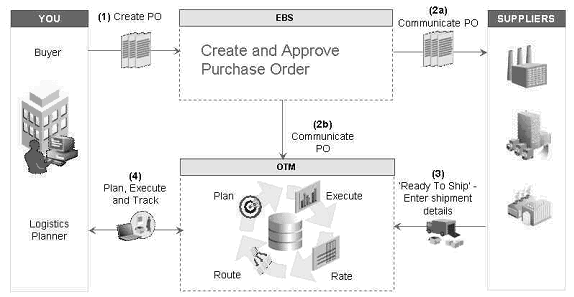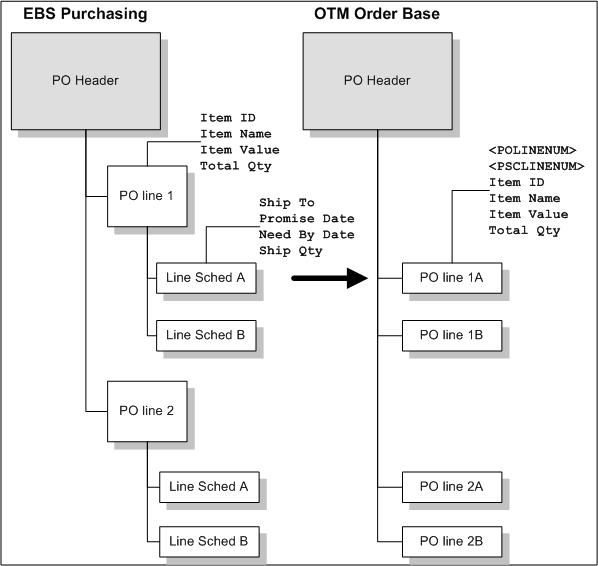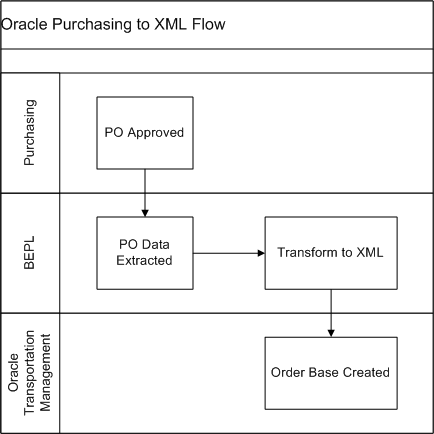Oracle Purchasing
Overview of Oracle Purchasing Integration with Oracle Transportation Management
Oracle Transportation Management integrates with Oracle Purchasing, enabling you to manage inbound freight from your suppliers.
The integration of Oracle Transportation Management enables you to plan and track the progress and status of inbound purchase order-related shipments. Purchase orders created in Oracle Purchasing are communicated to Oracle Transportation Management after approval, enabling you to execute (rate, route, track, and reconcile) the related shipment. Purchase order changes are also communicated to Oracle Transportation Management upon re-approval in Oracle Purchasing.
As part of the shipment process, Oracle Transportation Management enables suppliers to submit “ready to ship” information.
After shipping takes place, purchasing agents access carrier-provided shipment status updates within Oracle Transportation Management. After goods are delivered, invoices for freight payment are collected and processed for payment.
Note: With Oracle Purchasing, the item container weights, volumes, and dimensions are entered in Oracle Transportation by the supplier and are not sent from the Oracle E-Business Suite.
Inbound Purchase Order Flow

Functional Changes with Oracle Transportation Management Installed
Responsibility for Inbound Freight
Purchasing is enhanced with the Professional Buyers Work Center and web-based user interfaces. These interfaces are in addition to the forms user interfaces. The Purchase Order can be authored both in the web-based user interface as well as in application forms. In the forms version of the Purchase Order the inbound freight responsibility is determined by the purchase order header attribute named Transportation Arranged. This attribute is set in the Terms and Conditions window through the Purchase Orders window in Oracle Purchasing. In the web based user interface of the Purchase Order, the attribute is Transportation Arranger and is available in the Terms region of the Purchase Order Header tab. The attribute has the following values:
-
Buying Organization: The payment method code for inbound shipments in Oracle Transportation Management is set to Collect (buying organization is responsible for managing and paying for inbound transportation).
-
Supplier: The payment method code is set to Prepaid (supplier is responsible for managing and paying for inbound transportation).
-
Blank value or None: Purchase orders are not communicated to Oracle Transportation Management.
Note: Purchase Orders that have Progress Payments will not be communicated to Oracle Transportation Management.
Impact of Purchase Order Status Changes on Oracle Transportation Management
| Purchase Order Event | Impact in Oracle Transportation Management |
| Cancel Purchase Order | Prevents future releasing against all relevant PO shipments. |
| Open PO Shipment for Receiving | Allows future releasing against this PO shipment. |
| Close PO Shipment for Receiving | Prevents future releasing against this PO shipment. |
| Close Purchase Order | Prevents future releasing against this PO. |
| Finally Close Purchase Order | Prevents future releasing against this PO. |
| Place Purchase Order on Hold | Prevents future releasing against this PO. |
| Release Purchase Order Hold | Allows future releasing against this PO. |
Implementing Oracle Transportation Management with Oracle Purchasing
The following section describes the system configuration and setup changes required when you implement Oracle Transportation Management with Oracle Purchasing.
System Configuration and Setup Changes (Oracle Transportation Management)
The following section describes the system configuration and setup changes required in Oracle Transportation Management when integrating with Oracle Purchasing.
Setting Up Profile Options
The following profile options are required for the integration with Oracle Purchasing:
-
Client Timezone
-
Enable Timezone Conversions
-
Server Timezone
-
OTM: Domain Name
-
OTM: Domain Password
-
OTM: Domain User
-
OTM: Integration Enabled
Related Topics
For more information about profile options specific to the integration of Oracle Transportation Management with the Oracle E-Business Suite, see Profile Options and Parameters.
Oracle Purchasing Configuration and Setup Changes (Oracle E-Business Suite)
The following section describes the system configuration and setup changes required in Oracle Purchasing and the Oracle E-Business Suite when integrating with Oracle Transportation Management
Mapping Oracle Purchasing to Oracle Transportation Management
In the Oracle E-Business Suite, the purchase order or blanket release schedule is concatenated with the relevant line information to create an order baseline in Oracle Transportation Management, as shown in the following figure:
Mapping Purchase Order Shipments to Order Base Lines

For detailed mapping of Oracle Purchasing to Order Base XML, see the XML Mapping appendix, Purchasing Fields to Order Base XML Mapping.
Note: Purchase Orders that have Progress Payments will not be communicated to Oracle Transportation Management.
Configuring the BPEL Process Manager
All communication between Oracle Purchasing and Oracle Transportation Management is through the BPEL process PoSendPoToOtm. The Oracle E-Business Suite Business Event “oracle.apps.po.event.document_action_event” activates this process. Upon activation, the process calls an Oracle Purchasing API to extract the appropriate document data. It then converts the document data to a message in the Oracle Transportation Management schema and invokes the Oracle Transportation Management servlet.
Oracle Purchasing to XML

XML Translation via XSL in BPEL
Oracle Purchasing purchase order and release data are extracted from Oracle E-Business Suite in the database object PO_OTM_ORDER_TYPE. In the BPEL process, an XSL translation converts the data to an Oracle Transportation Management transmission.
The form of the transmission depends upon the action performed. In the case of a document approval or re-approval, the transmission consists of an Oracle Transportation Management TransOrder object, along with a set of Location and Contact objects. For control actions on existing documents, such as cancellation or closure, a GenericStatusUpdate object is transmitted.
The XSL translation implements integration-specific business logic, such as rounding quantities and selecting the appropriate contact methods for involved parties. The XSL step also performs some Oracle Transportation Management specific transformations to Oracle E-Business Suite data, such as generation of unique keys.
Web Services
The BPEL process communicates with Oracle E-Business Suite through the Business Event queue and the PO_OTM_INTEGRATION_PVT API. It terminates with a call to the Oracle Transportation Management servlet.